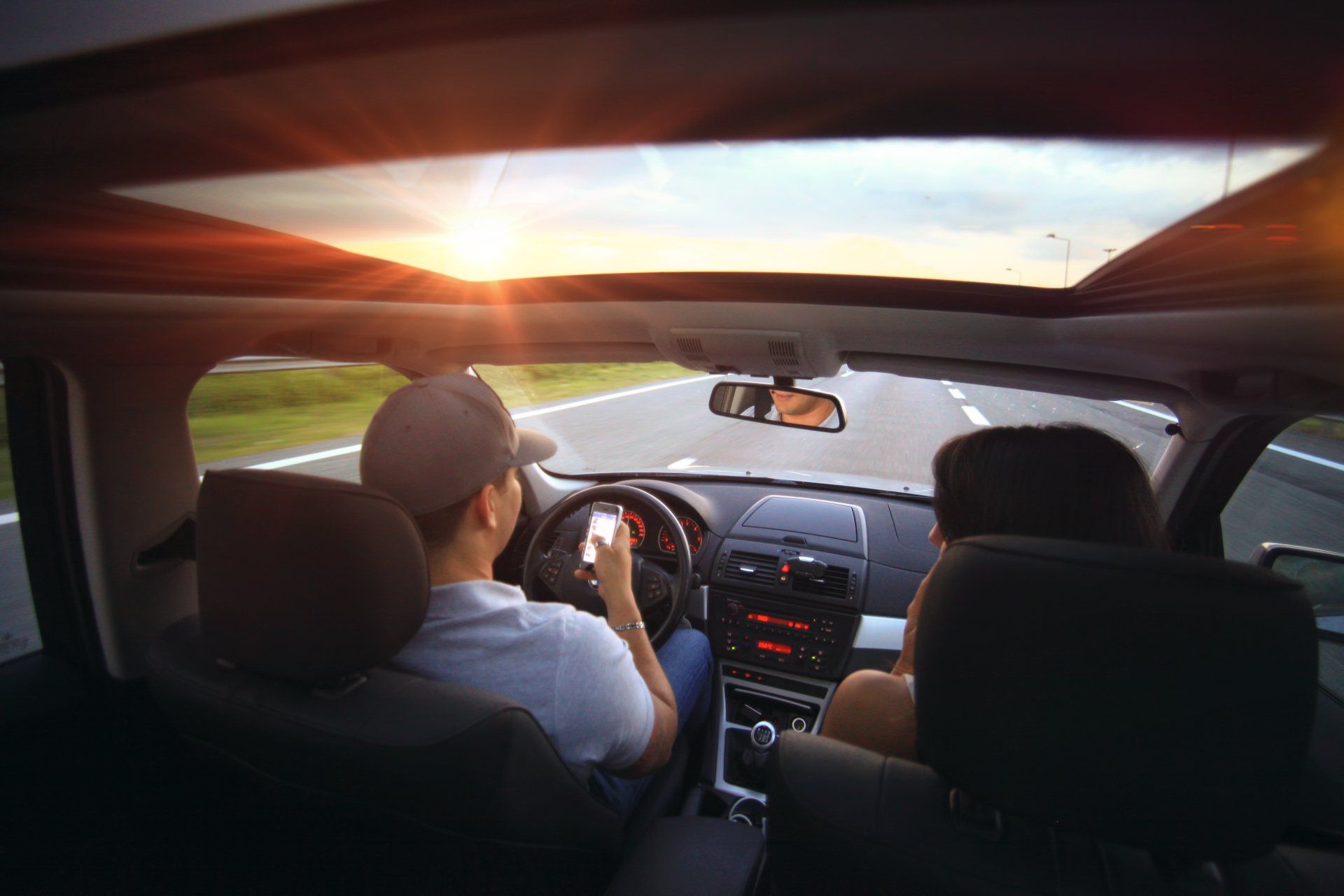Distracted Driving Laws in Ontario: What You Need to Know
Distracted driving is a safety issue that affects all Canadians. It is a national concern. All of Canada’s provinces, as well as the Yukon and Northwest Territories have some form of distracted driving legislation in place.
Important Statistics
Data collected by the Government of Ontario found that
- Every 30 minutes, one person is injured in a collision caused by distracted driving
- A driver using a phone while driving is 4 times more likely to crash than a driver focused on the road
CAA’s Distracted Driving website provides the following information
- Drivers involved in visual-manual interactions with mobile phones (i.e. texting) are up to 8x as likely to be involved in a crash. (AAA Foundation for Traffic Safety, 2017).
- When you check a text for 5 seconds and are travelling at 90km/h, it’s like travelling the length of a football field blindfolded.
- Approximately 26% of all car accidents involve use of a phone, including hands-free phone use. (National Safety Council).
- It is estimated that drivers using phones look at but fail to see up to 50% of the information in their driving environment. (National Safety Council, 2012).
- Drivers speaking on mobile devices, either hands-free or hand-held are up to 4x as likely to be involved in a crash. (AAA Foundation for Traffic Safety, 2017).
- 80% of collisions and 65% of near crashes have some form of driver inattention as contributing factors. (National Highway Traffic Safety Administration, 2010).
- Driver distraction is a factor in about 4,000,000 motor vehicle crashes in North America each year. (RCMP, 2014).
- 10% of fatal crashes, 18% of injury crashes, and 16% of all police-reported motor vehicle traffic crashes were distraction-affected crashes. (National Highway Safety Administration, 2015).
What Counts as Distracted Driving?
Driving distractions are activities or anything that take your eyes off the road, your hands off the wheel or your mind off the task of driving.
Symptoms can include, and are not limited to (courtesy of CanLyme)
Operating a hand-held communication and/or electronic entertainment device while driving such as:
- Cell Phones/Blackberries/Smart Phones
- iPods/MP3 players
- GPS
- iPads/Tablets
- E-readers
- Laptops
- DVD Players
- Viewing display screens unrelated to your driving.
If you are the one behind the wheel, these activities are considered distractions, whether you are stopped, in traffic or on a highway.
Consider the following statistics in terms of likeliness of being involved in an accident while engaged in one of the following activities
- 23 times more likely while text messaging on a cell phone
- 4-5 times more likely while talking on a cell phone
- 3 times more likely while reading
- 3 times more likely while applying makeup
- 9 times more likely while reaching for a moving object
- 3 times more likely while dialing a number on a hand-held device
- 1-3 times more likely while talking or listening on a hand-held device
Ontario Laws on Distracted Driving
In Ontario, it is against the law to use hand-held communication and electronic entertainment devices while driving. These include phones, iPods, iPads, Tablets, DVD players, e-readers. Even holding your phone or other device while driving is against the law.
In today’s world of ever evolving technology, and wearable technology, devices such as Apple watches and other smart watches could also be considered distracting devices. In a
recent court case concerning a distracted driving charge, an Apple Watch was referred to as “a cellphone taped to someone’s wrist”, due to its multi-functionality and ability to pair with a mobile device.
The set fine for distracted driving in Ontario is now $615 (including a victim surcharge fine and court fees), and drivers who receive a summons/contest their ticket in court may face a fine of up to $1,000 for a first time offence. If convicted of distracted driving, the driver will receive 3 demerit points and a 3-day licence suspension.
Penalties for Distracted Driving:
For fully licensed drivers
- 1st conviction – a fine up to $1000, 3 demerit points, a 3-day driver’s licence suspension
- 2nd conviction – fine up to $2000, 6 demerit points, 7-day driver’s licence suspension
- 3rd and all subsequent convictions – a fine up to $3000, 6 demerit points, 30-day driver’s licence suspension
For novice drivers
- 1st conviction – fine up to $1000 and 30-day licence suspension
- 2nd conviction – fine up to $2000 and 90-day licence suspension
- Third and all subsequent convictions – fine up to $3000 and cancellation of your licence and removal from the Graduated Licensing System
Tips to Avoid Distracted Driving
If you find yourself tempted to check your phone – keep it in the glove box so it won’t be easily accessible. Some other helpful tips:
Leave the makeup/comb at home
Don’t put on makeup, perfume, comb your hair or groom in your car. It is dangerous to take your eyes off of the road and hands off the wheel.
Don’t leave loose items on your seats
Put items you don’t need in your trunk, in a bag, in your glove compartment, or somewhere where they won’t fall and interfere with your ability to drive.
Don’t rush to your destination
Give yourself plenty of time to get to your appointment, meeting, class, to work etc.
Know where you are going
If you are traveling to a location you have never been to before, make sure you set your GPS (one that is either built in or mounted on the car’s dash, and reads the directions to you) before you leave.
Set your radio/music in advance
If you enjoy listening to music, put your MP3/iPod playlist on before you start driving, or if you like a particular station, turn it on before you start driving, so you don’t have to turn radio tuning knobs while driving or search for playlists while driving.
Curb your appetite
Before you start your journey, take a moment to satisfy your appetite. Enjoy your food and drinks before getting behind the wheel to avoid distractions. Keeping both hands on the wheel and your focus on driving helps to ensure the safety of yourself and others. Avoid eating things such as a sandwich, box of sushi, or fries while operating your vehicle. Let's prioritize the safety of all road users and maintain a distraction-free driving environment.
Use Bluetooth
If your car has Bluetooth technology, pair your smartphone with it in order to answer phone calls in “hands-free” mode. Otherwise, do not answer your phone while driving and take advantage of the voicemail feature. Stop at a safe location or wait until you get to your destination to make a phone call.
Save the cigarette for later
Smoking in your car is another distraction as it takes your hands off of the steering wheel.
The texts & emails can wait
If you are in the middle of a text message conversation (or email exchange), before you start driving, put a pause on the conversation so you can drive safely, or put your phone in silent so you won’t be tempted to look at it while driving. Same for emails.
What Should I Do if I am Involved in A Car Accident?
If you are the victim of a motor vehicle accident, whether you are a driver, passenger, cyclist, or pedestrian, you should consider speaking with a lawyer to determine what your rights are as an injured person. Your lawyer can explain what types of benefits and compensation you are entitled to when it comes to an accident benefits claim and a third-party claim (against the at-fault party).
It is important that you seek medical attention as soon as possible after the accident. You should also, if possible, obtain the names of any witnesses and any information you can about the driver/other parties involved. Try to write down how the accident happened and any other details if you can. Keep track of any damaged items including clothing. Contact your insurance company to advise them of the accident.
What Do I Bring to An Initial Consultation?
When you first meet with your lawyer, it is important you bring any documentation that is related to the accident including any partial motor vehicle accident report a police officer gave you or a collision centre report if you went to one.
If you have already completed your application for accident benefits, you should provide any correspondence you receive from your insurance company to your lawyer and copies of any documents you have sent the insurance company. If you have a full copy of your insurance policy, you should bring this with you. Your lawyer will need to know who your insurance company is and your policy number.
Your lawyer will need to request medical documentation and will need to know who your doctors and treatment providers are. If you have business cards for your doctors/treatment providers, bring them so your lawyer can easily obtain this information.
Our lawyers have helped clients who have sustained injuries as a result of car accidents. If you have been injured as a result of a car accident, contact Aaron Waxman and Associates to arrange a free initial consultation at a date and time that is convenient for you.
We offer a free initial consultation that can be arranged at a date and time of your choosing and at your convenience.
Recent posts from our Knowledge Centre
- This blog is for informational purposes only and is not meant to substitute legal advice. Please read our disclaimer for further information.
- All of our lawyers are licensed by The Law Society of Upper Canada
- Office in Toronto and able to represent people in the province of Ontario








